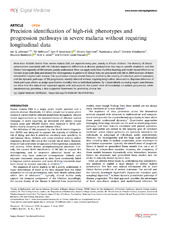| dc.contributor.author | Johnston, Iain George | |
| dc.contributor.author | Hoffmann, Till | |
| dc.contributor.author | Greenbury, Sam | |
| dc.contributor.author | Cominetti, Ornella | |
| dc.contributor.author | Jallow, Muminatou | |
| dc.contributor.author | Kwiatkowski, Dominic | |
| dc.contributor.author | Barahona, Mauricio | |
| dc.contributor.author | Jones, Nick | |
| dc.contributor.author | Casals-Pascual, Climent | |
| dc.date.accessioned | 2020-08-06T10:57:45Z | |
| dc.date.available | 2020-08-06T10:57:45Z | |
| dc.date.issued | 2019 | |
| dc.Published | Johnston IG, Hoffmann, Greenbury, Cominetti, Jallow, Kwiatkowski, Barahona, Jones N, Casals-Pascual. Precision identification of high-risk phenotypes and progression pathways in severe malaria without requiring longitudinal data. npj Digital Medicine. 2019;2:63 | eng |
| dc.identifier.issn | 2398-6352 | en_US |
| dc.identifier.uri | https://hdl.handle.net/1956/23515 | |
| dc.description.abstract | More than 400,000 deaths from severe malaria (SM) are reported every year, mainly in African children. The diversity of clinical presentations associated with SM indicates important differences in disease pathogenesis that require specific treatment, and this clinical heterogeneity of SM remains poorly understood. Here, we apply tools from machine learning and model-based inference to harness large-scale data and dissect the heterogeneity in patterns of clinical features associated with SM in 2904 Gambian children admitted to hospital with malaria. This quantitative analysis reveals features predicting the severity of individual patient outcomes, and the dynamic pathways of SM progression, notably inferred without requiring longitudinal observations. Bayesian inference of these pathways allows us assign quantitative mortality risks to individual patients. By independently surveying expert practitioners, we show that this data-driven approach agrees with and expands the current state of knowledge on malaria progression, while simultaneously providing a data-supported framework for predicting clinical risk. | en_US |
| dc.language.iso | eng | eng |
| dc.publisher | Nature | en_US |
| dc.rights | Attribution CC BY | eng |
| dc.rights.uri | http://creativecommons.org/licenses/by/4.0 | eng |
| dc.title | Precision identification of high-risk phenotypes and progression pathways in severe malaria without requiring longitudinal data | en_US |
| dc.type | Peer reviewed | |
| dc.type | Journal article | |
| dc.date.updated | 2019-11-20T13:27:41Z | |
| dc.description.version | publishedVersion | en_US |
| dc.rights.holder | Copyright 2019 The Author(s) | en_US |
| dc.identifier.doi | https://doi.org/10.1038/s41746-019-0140-y | |
| dc.identifier.cristin | 1749993 | |
| dc.source.journal | npj Digital Medicine | |

